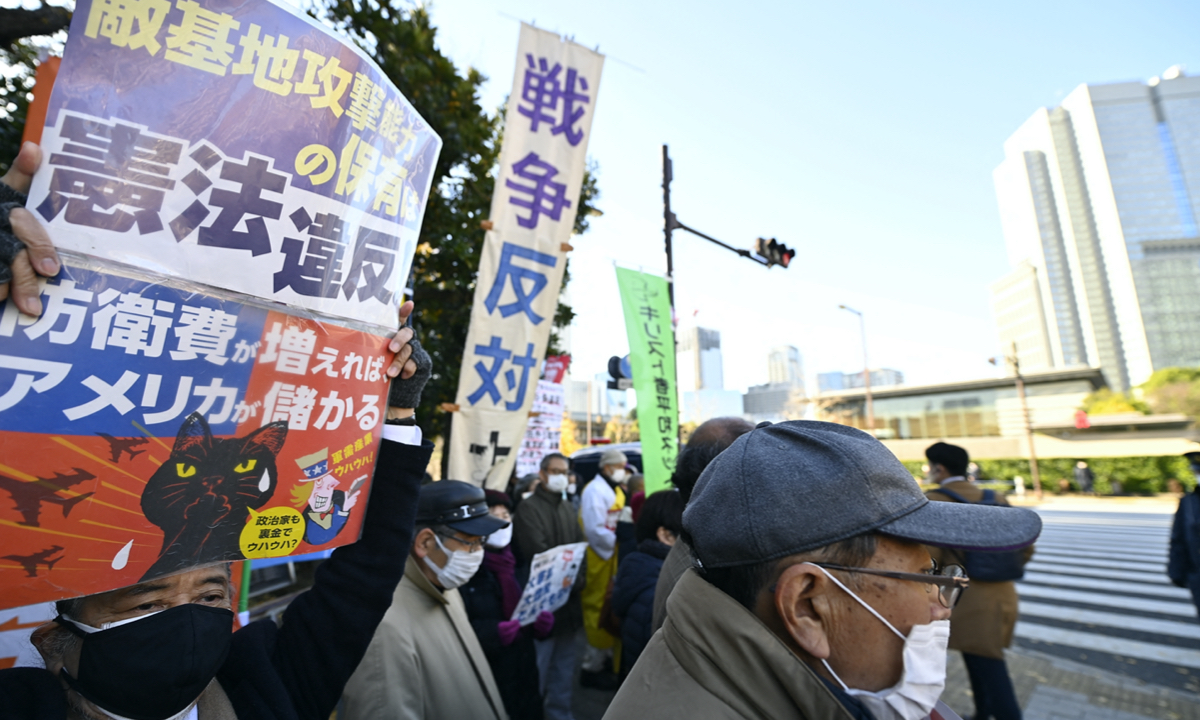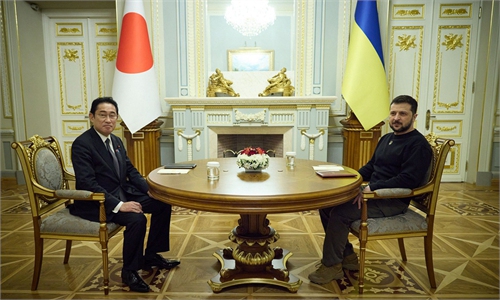Japan to use more confrontational words against China in diplomacy paper, harming bilateral ties and regional stability

People gather outside Japanese Prime Minister Fumio Kishida's office holding placards denouncing the violation of Article 9 of the Japanese Constitution in Tokyo on December 16, 2022. They also oppose the increase in the military spending budget. Japan approved its biggest military buildup since World War II on December 16. Photo: AFP
Japan is becoming increasingly aggressive with a hostile mentality in countering China, and the trend is likely to continue in the near future, Chinese experts warned, as Japan is reportedly set to hype up the "China threat theory" by calling Beijing its "greatest strategic challenge" in its upcoming annual foreign policy report.
Analysts also noted that the wording "greatest strategic challenge" used in Japan's 2023 diplomatic bluebook draft is the same used in Japan's recently updated National Security Strategy in December 2022. Compared with the diplomatic bluebook 2022, which carries a more restrained tone by referring to China as a "strong security concern," the 2023 edition will no longer hide Tokyo's assertiveness, as the influence of right-leaning conservative politicians grows.
Citing the draft obtained from the Japanese Foreign Ministry, Kyodo News said that Japan's diplomatic bluebook for 2023, which is expected to be released in April, will also highlight Tokyo's concerns over the Taiwan question, as China's diplomatic stance and military activities have become "a matter of serious concern for Japan and the international community."
The draft also stressed Tokyo's opposition against Russia in terms of threats of using nuclear weapons, and territorial disputes with Moscow. It also called for ties with South Korea to be mended, according to the Kyodo News.
The draft paper was revealed at a time when Japan seeks to beef up its international presence and speed up its path in collaborating with the US' "Indo-Pacific strategy" targeting China. After meeting with South Korean President Yoon Suk-yeol in Tokyo and agreeing to boost security ties on March 16, Japanese Prime Minister Fumio Kishida met with Indian Prime Minister Narendra Modi in New Delhi and announced an action plan for a new "Indo-Pacific initiative" aimed at "countering China's influence" on March 20.
Kishida also made a surprise trip to Ukraine to meet President Volodymyr Zelensky on Tuesday, playing up tensions by exaggerating concerns over the Taiwan Straits.
Da Zhigang, director of the Institute of Northeast Asian Studies at the Heilongjiang Provincial Academy of Social Sciences, told the Global Times on Friday that the wording "greatest strategic challenge" is the most confrontational expression of Japan's position toward China since the normalization of bilateral ties.
Japan continues to play up the "China threat theory," as containing China on all fronts is becoming Japan's diplomatic strategic goal, Da said.
It cannot be ruled out that Japan's defense white paper 2023 will also use this expression, with more emphasis on the situation across the Taiwan Straits, Da said.
On March 16, Japan deployed Ground Self-Defense Force units including missile squads to a remote southern island near China's Taiwan region and Diaoyu Islands, according to the Japan Times.
Zhu Qingxiu, a Japanese studies researcher at the Chinese Academy of Social Sciences, told the Global Times on Friday that Japan's 2023 diplomatic bluebook is very likely to be a continuation of the hostile and confrontational thinking toward China in its newly revised National Security Strategy.
Japan's updated national security plan includes provisions that would allow Tokyo to greatly increase defense spending and directly carry out attacks against enemy missile-firing facilities. China has urged Japan to learn from its lessons and not be obsessed with using the so-called "China threat" to indulge in military expansion.
According to Zhu, whether it is in Japanese politics, within the ruling Liberal Democratic Party, or Prime Minister Kishida himself, the hostility against China is very strong and there is no incentive for Japan to improve relations with China, which is partly due to the conservative swing to the right and partly due to pressure from the US.
However, it is unlikely that Japan will break completely with China in the larger picture of the China-US game, while the likelihood of a continuing cold shoulder is higher, analysts said.
There are conflicts between China and Japan in some areas, but it remains to be seen whether they will lead to a full confrontation, Da said.
People in both China and Japan who love peace and are committed to a healthy and stable relationship between the two countries should jointly halt the hostile atmosphere toward China, Da said.


